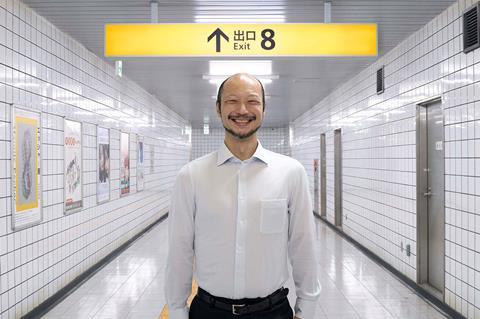Director Genki Kawamura’s twisting, inventive chiller bows in Cannes Midnight

Dir. Genki Kawamura. Japan 2025. 95mins
The theme music to Genki Kawamura’s conceptual chiller Exit 8 is Ravel’s Bolero, but it could easily have kicked off with Bob Dylan singing, “There must be some way out of here…” Based on an influential video game of the same name, Exit 8 plays like a nightmare version of the classic Seinfeld episode about trying to escape from an underground car park – except that here the location is a Tokyo subway station and a seemingly endless passageway that increasingly comes to resemble purgatory, or the twists of the human mind itself.
A rare game-based movie that actually has the feel of a game
Director and established novelist Kawamura played similar visual and temporal games to evoke the experience of old-age dementia in his 2022 drama A Hundred Flowers. In Exit 8, he uses such devices for a very different purpose. This ingenious mind-twister defies the IP’s built-in repetition to ingenious and entertaining, if sometimes mechanical effect – with echoes of high-concept films like Vicenzo Natali’s Cube and a more radically freaky Japanese entrapment oddity, Hitoshi Matsumoto’s 2009 Symbol. A rare game-based movie that actually has the feel of a game, with confoundingly tricky rules, Exit 8 should achieve solid cult status beyond Japan.
The film’s nameless protagonist (Kazunari Ninomiya) is travelling to work on the Tokyo subway amid a crowd of commuters, all lost in their phones – except for one stressed-out man who rages at the mother of a crying baby. Ignoring this, he disembarks and takes a call from his ex – she gives him some potentially life-changing news, which he’s manifestly not yet ready to handle. This sequence, executed in a long POV take, or a clever simulation thereof, sets up the drama in which the hero, identified in a caption as the ‘Lost Man’, is unable to get out of a zigzagging corridor that supposedly leads to an elusive Exit 8.
There’s no-one else around, except an older man who keeps robotically striding past him (the so-called ‘Walking Man’, played by Yamato Kochi). A noticeboard proclaims a set of rules for escaping: watch out for ‘anomalies’ and miss them at your peril. But as other figures appear in this sealed-in world, the Lost Man has to determine whether they are fellow hapless wanderers, or themselves anomalies.
The Lost Man walks on, sometimes turning back, his long-take progress cleverly edited to make the brightly-lit tiled passageway seem endless while the camera circles round him, enhancing the sense of disorientation. The film plays cannily on the suspenseful sense of repetition – we’re constantly hoping, and fearing, to find something new and significant around each corner. Just as it seems the film has nowhere to go, Kawamura takes a bracingly unexpected detour, with more to follow.
There’s no logical explanation for what’s happening, although one figure turns up to offer speculative interpretations – but the film gradually, if not altogether gracefully, makes it clear that our hero’s travails are very much bound up with the current state of his life, and with an ethical transgression that has sparked his whole journey. The drama’s underlying theme of social and personal conscience clearly lifts Exit 8 beyond the more mechanical aspects of its gaming origins, although Kawamura doesn’t quite handle it without a certain mawkishness.
At their best, the twists adroitly wrongfoot the audience, and the characters too, although there’s one grotesque jump scare-laden section that comes as an jarring deviation. Otherwise, allusions to The Shining, both in imagery and in Kubrick-style compositions, as well as to the Moebius-strip art of M.C. Escher, give the film a genuinely unsettling coherence. Ryo Sugimoto’s production design brings a dream dimension to what ostensibly seems a mundane everyday setting. The acting also provides a plausible human factor, with Ninomiya veering between desperation and composed determination, and Kochi contributing an eccentric and unpredictable presence.
Production companies: STORY Inc, AOI Pro
International sales: GoodFellas smichel@goodfellas.film
Producer: Yuko Sakata
Screenplay: Kentaro Hirase, Genki Kawamura
Cinematography: Keisuke Imamura
Production design: Ryo Sugimoto
Editor: Sekura Seya
Music: Yasutaka Nakata (Capsule), Shohei Amimori
Main cast: Kazunari Ninomiya, Yamato Kochi, Naru Asanuma, Kotone Hanase
























